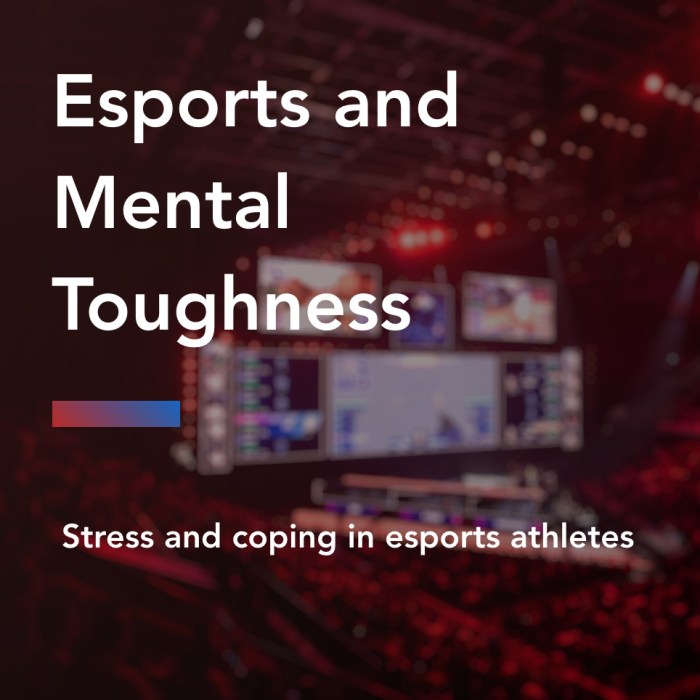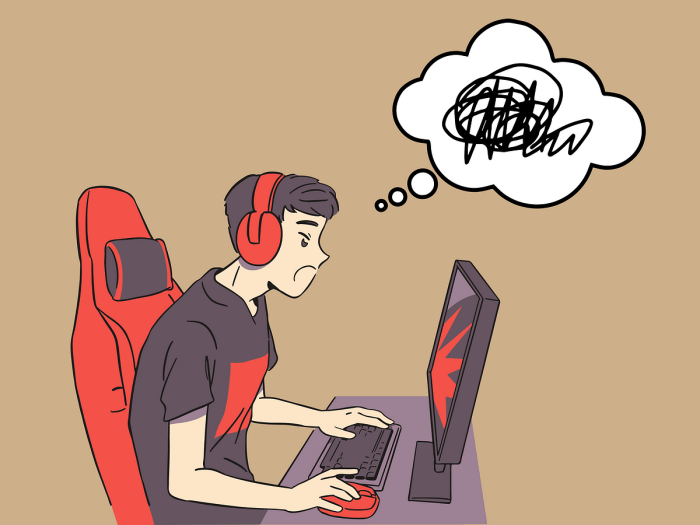Psychology Successful Esports Players Mental Strategies: The world of competitive gaming demands more than just lightning-fast reflexes and expert mechanics. To reach the pinnacle of esports, players must cultivate a powerful mental game, mastering strategies for handling pressure, regulating emotions, and fostering peak performance.
This exploration delves into the fascinating psychological landscape of elite esports athletes, revealing the mental techniques and training methods that separate champions from contenders. We’ll uncover the secrets behind their resilience, focus, and teamwork, offering insights that can benefit gamers of all levels.
From analyzing the cognitive skills crucial for strategic decision-making under intense pressure to examining the emotional intelligence needed to navigate setbacks and maintain a positive mindset, we’ll dissect the key elements of a winning mental game. We’ll look at how different esports genres demand unique mental approaches, and how top players utilize techniques like visualization, mindfulness, and cognitive training to optimize their performance.
Prepare to gain a competitive edge – both in-game and in life – by understanding the psychology behind esports success.
Mental Fortitude in Esports: Psychology Successful Esports Players Mental Strategies

The path to esports success isn’t solely paved with lightning-fast reflexes and impeccable technical skill. While those are undeniably crucial, the mental game often determines who rises to the top and who falls short. The ability to maintain composure under immense pressure, adapt to unexpected challenges, and consistently perform at a high level separates the champions from the also-rans.
This is where mental fortitude becomes the ultimate differentiator.
Key Mental Attributes of Successful Esports Players
Elite esports athletes possess a unique blend of mental characteristics. These aren’t inherent traits; they’re developed and honed through rigorous training and self-awareness. Key attributes include exceptional focus and concentration, allowing them to maintain peak performance even amidst the chaos of competition.
They also demonstrate remarkable self-control, managing emotions effectively to avoid impulsive decisions that can derail performance. Furthermore, successful players exhibit a high level of resilience, bouncing back from setbacks and learning from mistakes without losing confidence. Finally, a strong sense of self-belief and unwavering confidence are crucial for maintaining a positive mindset and pushing through difficult moments.
These mental muscles are as vital as physical dexterity in the world of competitive gaming.
Resilience and Performance Under Pressure
Resilience is the cornerstone of success in esports. The pressure cooker environment of professional gaming throws countless challenges at players – unexpected team compositions, technical glitches, and the relentless pressure of high-stakes matches. Players with high resilience don’t crumble under this weight; they adapt.
They analyze their mistakes, adjust their strategies, and use setbacks as fuel to improve. This adaptability allows them to maintain focus and performance even when facing overwhelming odds. Consider Faker, widely considered one of the greatest League of Legends players of all time.
He’s known for his incredible ability to recover from seemingly insurmountable deficits, demonstrating exceptional resilience and mental fortitude.
Mental Strategies for Stress and Anxiety Management, Psychology successful esports players mental strategies
Top esports players employ a variety of mental strategies to manage stress and anxiety. Many utilize mindfulness techniques, such as meditation or deep breathing exercises, to center themselves before and during competitions. Others rely on visualization, mentally rehearsing successful plays and outcomes to build confidence and reduce anxiety.
Some players employ positive self-talk, replacing negative thoughts with affirming statements to maintain a positive mindset. Finally, a structured routine, including consistent sleep schedules and healthy diets, contributes significantly to overall mental well-being and performance. These proactive strategies are vital in navigating the intense pressures of professional gaming.
Comparative Mental Approaches Across Esports Genres
| Genre | Strategy for Handling Pressure | Focus Techniques | Teamwork Mindset |
|---|---|---|---|
| MOBA (e.g., League of Legends) | Strategic retreats, adapting to changing game states, focusing on individual and team objective completion. | Maintaining awareness of the minimap, prioritizing key objectives, and focusing on immediate tasks. | Strong communication, coordinated strategies, and mutual support. |
| FPS (e.g., Counter-Strike) | Calm decision-making under fire, adapting to enemy strategies, and utilizing team support. | Maintaining situational awareness, focusing on individual aiming and target acquisition. | Effective communication, coordinated flanking maneuvers, and trust in teammates. |
| RTS (e.g., StarCraft II) | Maintaining composure during complex macro and micro management, adjusting to opponent strategies, and efficient resource allocation. | Prioritizing tasks based on urgency, focusing on economic development, and maintaining an overview of the entire game. | While often solo, understanding opponent strategies and adapting is crucial; in team-based RTS games, strong coordination is key. |
The Impact of Training and Preparation

In the high-stakes world of professional esports, raw talent alone isn’t enough to consistently reach the top. The mental game, honed through rigorous training and preparation, is the crucial differentiator between a good player and a champion. This section delves into the profound impact of psychological preparation on esports performance, examining techniques, organizational support, and a visual representation of the mental journey to tournament success.Psychological preparation is no longer a luxury; it’s a necessity for elite esports athletes.
It’s integrated into training regimens alongside physical practice, focusing on developing mental resilience, strategic thinking, and emotional control under pressure. This holistic approach ensures players are not only skilled mechanically but also mentally equipped to handle the intense demands of competition.
Ignoring this aspect is akin to sending a Formula 1 car to the race track without properly tuning the engine – it might have the potential for speed, but it won’t perform optimally.
Visualization and Mental Rehearsal Techniques
Visualization and mental rehearsal are powerful tools used by top esports players to enhance performance. These techniques involve mentally simulating game scenarios, practicing strategies, and rehearsing reactions to different situations. By repeatedly visualizing success, players build confidence, improve reaction time, and reduce anxiety.
For example, a Counter-Strike player might visualize a clutch round, mentally running through the map, predicting enemy movements, and executing their planned strategy flawlessly. This mental practice strengthens neural pathways, making the actual execution smoother and more instinctive during gameplay.
The consistent use of these techniques translates into improved decision-making under pressure and increased accuracy, leading to higher win rates.
Esports Organization Support for Mental Well-being
Progressive esports organizations are increasingly recognizing the importance of supporting their players’ mental well-being. This support often includes access to sports psychologists, mindfulness training, and stress management techniques. Teams like Cloud9 and Fnatic have publicly invested in mental health resources for their players, acknowledging that a player’s mental state significantly impacts their performance and overall health.
These resources can range from individual therapy sessions to team-building exercises designed to foster a supportive and collaborative environment. Providing this support isn’t just ethically responsible; it’s a strategic investment that improves player performance, reduces burnout, and fosters long-term team stability.
Stages of Psychological Preparation for a Major Esports Tournament
Imagine a visual representation as a circular diagram, progressing clockwise. The circle is divided into five distinct segments, each representing a crucial stage of mental preparation.The first segment (top, bright green) is Pre-Tournament Focus: A solid green triangle symbolizes concentration and strategic planning.
The second segment (top right, sunny yellow) is Peak Performance: A radiant sun represents optimal mental and physical state. The third segment (bottom right, calming blue) is In-Tournament Resilience: A steady blue wave symbolizes managing pressure and maintaining composure. The fourth segment (bottom, deep orange) is Post-Match Reflection: A calm orange circle represents analyzing performance and identifying areas for improvement.
The final segment (bottom left, purple) is Recovery and Regeneration: A purple spiral symbolizes rest, relaxation, and mental rejuvenation.The colors chosen evoke specific feelings and states of mind. Green symbolizes growth and focus, yellow represents energy and positivity, blue denotes calm and stability, orange signifies reflection and learning, and purple represents renewal and recovery.
The shapes are carefully selected to represent the dynamic nature of mental preparation, with triangles for sharp focus, waves for resilience, and spirals for the cyclical nature of recovery. The overall circular shape emphasizes the continuous and iterative nature of the process.
End of Discussion
Mastering the mental game is the ultimate differentiator in the fiercely competitive world of esports. By understanding and implementing the psychological strategies discussed – from cultivating mental fortitude and managing emotions to optimizing teamwork and leveraging cognitive skills – players can unlock their full potential.
This isn’t just about winning matches; it’s about building resilience, fostering a growth mindset, and developing crucial life skills applicable far beyond the digital battlefield. The journey to esports mastery begins within, and this exploration provides the roadmap to success.
Q&A
What are some common mental health challenges faced by esports players?
Esports players often experience anxiety, depression, burnout, and sleep disturbances due to intense competition, long practice hours, and public pressure.
How can esports organizations better support their players’ mental well-being?
Organizations can provide access to mental health professionals, promote work-life balance, implement stress-management programs, and foster a supportive team environment.
Can mental training improve reaction time in esports?
While mental training won’t directly improve raw reaction speed, it can enhance focus, reduce impulsive decisions, and improve decision-making under pressure, indirectly leading to better in-game performance.
What role does sleep play in esports performance?
Adequate sleep is crucial for cognitive function, emotional regulation, and physical recovery. Lack of sleep negatively impacts reaction time, decision-making, and overall performance.
Leave a Reply